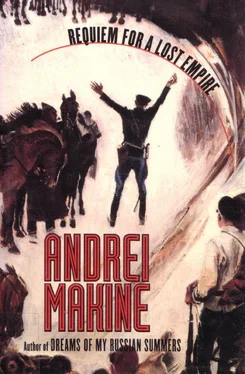"When they were executed," Shakh was saying, "I made a naive vow, I was naive, like all believers. Yes, I vowed to fight on until a monument had been erected to them, a real one, a big one at the very heart of New York City. But they haven't done it, not even in Moscow."
When he had gone I spent a long time roaming through the streets beneath a kind of snow, little gray stinging granules. Toward evening the weather became milder and real snowflakes fluttered down in the glow from the street lamps. Children congregated in front of shop windows in which mechanical Santa Clauses ceaselessly drew beribboned gifts out of their sacks. In the cathedral, in a more dignified and static replica of this, the three kings around the crib offered their presents, too. And the festive atmosphere was even in evidence in the street where there were near-naked young women smiling at the passersby from inside some of the wide bay windows on the first floor. Beside the chair on which each woman displayed herself, sometimes with open thighs, sometimes kneeling on the seat to show off curved buttocks, there was a little Christmas tree glittering with a string of flashing fairy lights. Before settling down in the bar where the agent was to find me, I plunged in among wooden booths, a noisy, festively decorated village that occupied the whole cathedral square. The warmth of the braziers was cut into by waves of cold, the voices, warmed with alcohol, lost their Germanic harshness, and for me a glass of mulled wine had the taste of an existence quite different from mine, yet very close at hand. At the bar, I reflected on this nearness as I became aware from a clock above the counter of the increasingly obvious lateness of the man I was to meet. A time came when the delay was such that, instead of the person expected, other individuals might well accost me, show me their cards, ask me to follow them. Such delays were generally the result of a series of setbacks. Mentally I pursued the series to its logical conclusion: the discovery of the two diskettes that Shakh had passed on to me, arrest, interrogation, a long prison sentence that I would have to serve somewhere in this country. It suddenly seemed to me so simple to get up, walk out into this brightly lit city, and lose myself in the evening crowd, in its wooden villages decorated with fir branches. My current identity, my papers, made me humdrum, invisible. I could have crossed the increasingly open frontiers of this new old Europe, settled down either here or elsewhere. The memory, already very remote, of my first day in the Western World came back to me: Berlin, the private showing, and the stamp dealer who had for several hours, without knowing it, entered our games of espionage. Entered them and left them again forever. I should imitate him. Like him, I had a profession. I could close this parenthesis and return to it. Our lives, after all, are wholly made up of parentheses. The art is knowing how to close them at the right moment.
I glanced at the clock, ordered another drink. I recalled that, as I was strolling through the streets, I had encountered a scene that came back to me now with its whiff of bourgeois happiness: on the steps of a large private house a doctor in a white coat was bidding good-bye to an elderly patient who was accompanied by his aged wife. It was clear that the doctor was enjoying the coolness of a few snowflakes landing on his bare head and found it pleasant to step outside his office and make this show of courtesy, especially toward this particular patient, possibly his last before the holiday began.
Before we moved on again it was you who told me about the death of the man I had been vainly waiting for in that city with its fairy tale decorations. An anonymous hotel room, a body that no one claimed, his belongings painstakingly searched. No doubt they were looking for those two diskettes he had not had time to collect. So I had been waiting for a dead man…
I would never find the courage to admit to you that while I was waiting for him I had felt envious of a respectable German doctor baring his head to the flurries of snow. And that I had placed you, alongside Shakh, in that blinkered generation who were living in another era.
When you told me about the agent's death you also spoke of Yulia and Yuri and I realized you had been trying to gather up at least those scraps of information that generally accompanied the disappearance of people like ourselves: a hotel room buzzing with police, a burned-out car on waste ground. "I should have warned them, well, explained to them that…" You looked at me, as if seeking help. "You should have explained to them," I thought, "that it was too late to have any illusions."
In the end I dared to say it to you. I yelled it in your ear, trying to overcome the noise filling that crazy airplane and the night sky around it, in darkness torn into blinding shreds by salvos from antiaircraft batteries.
The plane was evacuating the remnants of a war that the empire had lost beneath this southern sky The bowels of the machine were piled high with the living, the wounded, and the dead, wrapped in long sheaths of black plastic. The mound of these cocoons stirred in the shadows, alongside the cases of ammunition and the tangle of weapons that looked like a huge metallic spider. The living, slumped down in the midst of this chaos, each resorted to their own stratagems for dealing with fear. Some tried to talk at the tops of their voices, drawing their neighbors' heads toward their mouths, others stopped their ears and, with their faces twisted into a grimace, huddled in upon themselves. Some slept and were confused with the dead. And when the plane began tipping over sharply on one wing and the wounds came back to life in this new position, the cries of the wounded redoubled and beyond the cocoons the grating of the metallic spider could be heard. I held you by your shoulders and my lips, enmeshed in your hair, burned your cheek and ear with these truths, carved into the stifling blackness of that flying cemetery. I was proclaiming the end, defeat, the pointlessness of the lives we had used up, the stupid blindness of Shakh, the misery of the peoples we had dragged into a suicidal enterprise. You seemed to be listening to me, then, when suddenly the aircraft went into a tight spiral and the howling of the wounded drowned out all other sounds, you broke away from me and, taking a flask from your knapsack, slipped in among bodies seated and lying there toward the front, where the flashlights of the nurses could be made out.
We arrived in Moscow after an absence of two and a half years and, as ever, spent little time there. Those years had coincided with the start of the great upheavals of '89 to '91. There was still a touch of grotesque comedy about recently acquired wealth, the new roles were not yet learned by heart, the new language remained hesitant. The actors made faux pas. Like the beggar trying to catch the warm gusts of air emanating from the door of a big store-a genuine war veteran, no doubt, but one who had attached all kinds of cheap insignia to his jacket to swell the numbers. These gilded disks eclipsed the tarnished silver of the medal "For Gallantry" that was hard won in the war. Or those two women waiting for clients outside a hotel for foreigners. Monumental in their fur coats, they seemed as immovable and unapproachable as statues of empresses. Their scenario consisted of pretending they had just emerged from the hotel, but the snow where they maintained their vigil had long since become pitted with little holes from their stiletto heels. "One day," I thought, "they, too, will have the right to a place in a heated window and even a little Christmas tree with a string of flashing lights."
It was a few blocks away from that hotel, beside the entrance to a restaurant, that we were caught up in the bibulous surge of a banquet that came streaming out onto the sidewalk. A score of men and women were roaring with laughter and congratulating one another on their great idea: to go and get themselves photographed between courses in front of the nearby Kremlin towers. "Get going, you guys!" yelled the ringleader. "Maybe they'll be putting up eagles instead of red stars tomorrow. This'll be a historic picture!" We stepped back to the edge of the sidewalk to let them pass. It was comic to see the clothes from fashion magazines on bodies that were too hefty or too square, all this stylish luxury combined with their broad, red, laughing faces. The women were rubbing their shoulders, shivering exaggeratedly with the cold, the men grabbed them by the waist, squeezed them, pawed them. One of them lifted his partner in the air and her dress rode up to reveal massive thighs, robustly and aggressively immodest. The ringleader banged with his fist on the door of a huge Mercedes and out jumped a sleepy man, his driver or his bodyguard, who handed him a camera. There was something undoubtedly legitimate and at the same time obscene about their merriment. I could not find a way to disentangle the two. I was waiting for your reaction but you walked along, saying nothing, occasionally raising your face toward the swirling of the snow.
Читать дальше










